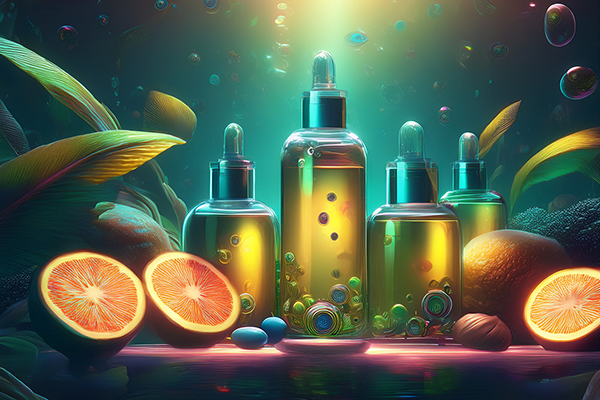
What They Are and Why Your Skin Needs Them
In the world of skincare, antioxidants are a powerhouse group of ingredients that help protect the skin from damage, slow down visible aging, and restore a healthy, radiant glow. They neutralize free radicals—unstable molecules caused by pollution, UV rays, stress, and even our own metabolism—that can lead to premature aging, inflammation, and cellular breakdown.
Whether you’re looking to brighten your complexion, soothe irritation, or reduce wrinkles, antioxidants offer a wide range of benefits for every skin type. Let’s take a closer look at some of the best antioxidants in skincare and what makes each of them so effective.
1. Vitamin C (Ascorbic Acid)
Best for: Brightening, uneven skin tone, sun damage
Vitamin C is one of the most well-researched and widely used antioxidants in skincare—and for good reason. It helps neutralize free radicals while stimulating collagen production and brightening dull or hyperpigmented skin. Regular use of Vitamin C can reduce dark spots, improve skin texture, and offer added protection from UV-induced oxidative stress.
Pro tip: Use them in the morning under sunscreen.
Common pairings: Vitamin E, ferulic acid, hyaluronic acid
2. Vitamin E (Tocopherol)
Best for: Dry or sensitive skin, barrier support
Vitamin E is a fat-soluble antioxidant that naturally occurs in the skin but can become depleted due to sun exposure and pollution. It’s deeply moisturizing and helps repair the skin barrier while enhancing the efficacy of other antioxidants like Vitamin C.
Pro tip: Vitamin E works synergistically with Vitamin C—together, they offer amplified antioxidant protection.
Common pairings: Vitamin C, ferulic acid, plant oils
3. Green Tea Extract (EGCG - Epigallocatechin Gallate)
Best for: Redness, inflammation, acne-prone skin
Green tea is rich in polyphenols, particularly EGCG, a potent antioxidant with anti-inflammatory and antimicrobial properties. It helps calm irritation, reduce redness, and protect against UV-induced damage. It’s an excellent choice for sensitive or acne-prone skin.
Pro tip: Use green tea-based products post-sun exposure to help soothe skin and reduce inflammation.
Common pairings: Caffeine, aloe vera, niacinamide
4. Coenzyme Q10 (CoQ10)
Best for: Fine lines, dullness, mature skin
CoQ10 is a naturally occurring enzyme in our bodies that declines with age. It supports cellular energy production and helps fight oxidative stress, making it a great anti-aging ingredient. Topically, it helps revitalize skin cells, improve skin tone, and reduce the depth of fine lines.
Pro tip: CoQ10 is typically found in creams or serums and pairs well with hydrating ingredients for maximum results.
Common pairings: Vitamin E, squalane, peptides
5. Resveratrol
Best for: Aging skin, urban or pollution-exposed skin
Derived from red grapes, berries, and even red wine, resveratrol is a potent antioxidant known for its anti-inflammatory and anti-aging effects. It helps protect against environmental stressors and supports collagen synthesis, making it especially beneficial for aging or stressed skin.
Pro tip: Apply at night to support the skin’s natural repair processes, often found in serums or moisturizers.
Common pairings: Niacinamide, peptides, hyaluronic acid.
6. Niacinamide (Vitamin B3)
Best for: Redness, uneven texture, enlarged pores
Niacinamide is a standout antioxidant that does more than protect from free radicals—it also improves skin tone, reduces inflammation, supports the skin barrier, and regulates oil production. It’s one of the most versatile ingredients suitable for nearly every skin type.
Pro tip: Niacinamide is non-irritating and can be used morning and night. It plays well with almost every other ingredient, making it a great addition to any routine.
Common pairings: Zinc, retinol, hyaluronic acid, Vitamin C (in stable formulations)
7. Ferulic Acid
Best for: Sun-exposed skin, antioxidant support
Ferulic acid is a plant-based antioxidant that not only fights free radicals but also stabilizes and boosts the efficacy of other antioxidants—especially Vitamin C and E. It’s commonly found in high-performance antioxidant serums and provides excellent protection against UV-induced aging.
Pro tip: Apply in the morning under sunscreen for a boosted layer of environmental defense.
Common pairings: Vitamin C, Vitamin E, resveratrol
8. Alpha-Lipoic Acid (ALA)
Best for: Texture, fine lines, and antioxidant defense
Alpha-lipoic acid is both water- and fat-soluble, allowing it to work in every part of the skin cell. It’s a highly effective antioxidant that helps reduce inflammation, improve skin texture, and diminish fine lines. ALA also enhances the performance of other antioxidants and promotes a more even skin tone.
Pro tip: Use in small concentrations, especially if you have sensitive skin, as ALA can be potent.
Common pairings: CoQ10, green tea, Vitamin C
Antioxidants not only protect the skin from future damage but also help repair existing damage—making them essential for both prevention and correction. Here’s how they help your skin:
• Prevent premature aging by neutralizing free radicals
• Support collagen production, improving firmness and elasticity
• Brighten skin tone and reduce discoloration
• Strengthen the skin barrier, reducing sensitivity and inflammation
• Enhance the effectiveness of sunscreens when used during the day
Tips for Using Antioxidants in Skincare
• Layer correctly: Apply antioxidant serums before heavier moisturizers or SPF.
• Use daily: For maximum benefits, antioxidants should be part of your daily routine, especially in the morning.
Final Thoughts: Antioxidants Are Skincare Essentials
Incorporating antioxidants into your skincare routine is one of the smartest moves you can make for long-term skin health. Whether you’re focused on preventing signs of aging, calming inflammation, or simply boosting your skin’s natural glow, there’s an antioxidant out there for you.
Ready to give your skincare a serious upgrade? Look for antioxidant-rich serums like our Solution From Pollution —and get ready to glow from the inside out.
